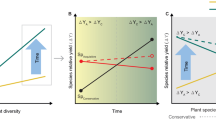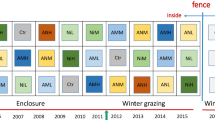Abstract
Experiments that simulate nonrandom species loss from natural communities can offer a fundamentally different understanding of the impacts of species loss on ecosystem function and their underlying mechanisms compared to seeding experiments where species are randomly assembled from a local species pool. We examined the mechanisms underlying changes in primary productivity following experimental species loss scenarios in Mongolian grassland. The range of species loss scenarios was based on natural patterns of species abundance that reflect the species’ contributions to ecosystem processes. We found a clear reduction in productivity due to species loss only when species were lost randomly. Grassland productivity was relatively robust following nonrandom species loss scenarios. Even in the context of density compensation, the decrease in dominant trait values for leaf height would explain the reduction in productivity with random species loss. In contrast, the maintenance of dominant trait values of key productivity traits such as leaf dry matter content and leaf height might contribute to the maintenance of productivity in response to nonrandom species loss. Our experiment demonstrated that the responses and mechanisms of primary productivity to species loss differ according to the scenarios of species loss in natural grassland communities. The effects of diversity on productivity might be weak in mature natural systems when species loss is nonrandom. Understanding the consequences of realistic species loss on ecosystem functioning based on field-based removal experiments will give insights into real conservation strategies in the face of global biodiversity change.

Similar content being viewed by others
References
Bai YF, Han XG, Wu JG, Chen ZZ, Li LH (2004) Ecosystem stability and compensatory effects in the Inner Mongolia grassland. Nature 431:181–184. doi:10.1038/nature02850
Botta-Dukat Z (2005) Rao’s quadratic entropy as a measure of functional diversity based on multiple traits. J Veg Sci 16:533–540. doi:10.1111/j.1654-1103.2005.tb02393.x
Cadotte MW, Carscadden K, Mirotchnick N (2011) Beyond species: functional diversity and the maintenance of ecological processes and services. J Appl Ecol 48:1079–1087. doi:10.1111/j.1365-2664.2011.02048.x
Cardinale B (2012) Impacts of biodiversity loss. Science 336:552–553. doi:10.1126/science.1222102
Cardinale BJ, Duffy JE, Gonzalez A, Hooper DU, Perrings C, Venail P et al (2012) Biodiversity loss and its impact on humanity. Nature 486:59–67. doi:10.1038/nature11148
Carmona CP, Azcarate FM, de Bello F, Ollero HS, Leps J, Peco B (2012) Taxonomical and functional diversity turnover in Mediterranean grasslands: interactions between grazing, habitat type and rainfall. J Appl Ecol 49:1084–1093. doi:10.1111/j.1365-2664.2012.02193.x
Collins SL, Steinauer EM (1998) Disturbance, diversity and species interactions in tallgrass prairie. In: Knapp AK, Briggs JM, Hartnett DC, Collins SC (eds) Grassland Dynamics: Long-term Ecological Research in Tallgrass Prairie. Oxford University Press, New York, pp 140–156
Collins SL, Knapp AK, Briggs JM, Blair JM, Steinauer EM (1998) Modulation of diversity by grazing and mowing in native tallgrass prairie. Science 280:745–747. doi:10.1126/science.280.5364.745
Conti G, Díaz S (2013) Plant functional diversity and carbon storage: an empirical test in semi-arid forest ecosystems. J Ecol 101:18–28. doi:10.1126/science.280.5364.745
Cornelissen JHC, Lavorel S, Garnier E, Dıaz S, Buchmann N, Gurvich DE et al (2003) A handbook of protocols for standardised and easy measurement of plant functional traits worldwide. Aust J Bot 51:335–380. doi:10.1071/BT02124
Cornwell WK, Schwilk DW, Ackerly DD (2006) A trait-based test for habitat filtering: convex hull volume. Ecology 87: 1465–1471. doi:10.1890/0012-9658(2006)87[1465:ATTFHF]2.0.CO;2
de Bello F, Leps J, Lavorel S, Moretti M (2007) Importance of species abundance for assessment of trait composition: an example based on pollinator communities. Commun Ecol 8:163–170. doi:10.1556/ComEc.8.2007.2.3
Díaz S, Lavorel S, De Bello F, Quetier F, Grigulis K, Robson TM (2007) Incorporating plant functional diversity effects in ecosystem service assessments. Proc Natl Acad Sci USA 104:20684–20689. doi:10.1073/pnas.0704716104
Flynn D, Mirotchnick N, Jain M, Palmer M, Naeem S (2011) Functional and phylogenetic diversity as predictors of biodiversity-ecosystem function relationships. Ecology 92:1573–1581. doi:10.1890/10-1245.1
Garnier E, Cortez J, Billes G, Navas ML, Roumet C, Debussche M et al (2004) Plant functional markers capture ecosystem properties during secondary succession. Ecology 85:2630–2637. doi:10.1890/03-0799
Gonzalez A, Loreau M (2009) The causes and consequences of compensatory dynamics in ecological communities. Annu Rev Ecol Evol Syst 40:393–414. doi:10.1146/annurev.ecolsys.39.110707.173349
Grace JB et al (2007) Does species diversity limit productivity in natural grassland communities? Ecol Lett 10:680–689. doi:10.1111/j.1461-0248.2007.01058.x
Grigulis K, Lavorel S, Krainer U, Legay N, Baxendale C, Dumont M et al (2013) Relative contributions of plant traits and soil microbial properties to mountain grassland ecosystem services. J Ecol 101:47–57. doi:10.1111/1365-2745.12014
Grime JP (1998) Benefits of plant diversity to ecosystems: immediate, filter and founder effects. J Ecol 86:902–910. doi:10.1046/j.1365-2745.1998.00306.x
Grubov VI (1982) Key to the vascular plants of Mongolia. Science Publishers, Enfield
Hooper DU, Chapin FS, Ewel JJ, Hector A, Inchausti P, Lavorel S et al (2005) Effects of biodiversity on ecosystem functioning: a consensus of current knowledge. Ecol Monogr 75:3–35. doi:10.1890/04-0922
Isbell F, Calcagno V, Hector A, Connolly J, Harpole WS, Reich PB et al (2011) High plant diversity is needed to maintain ecosystem services. Nature 477:199–202. doi:10.1038/nature10282
Isbell F, Tilman D, Polasky S, Binder S, Hawthorne P (2013) Low biodiversity state persists two decades after cessation of nutrient enrichment. Ecol Lett 16:454–460. doi:10.1111/ele.12066
Jigjidsuren S, Johnson DA (2003) Forage Plants of Mongolia. Admon Publishing Co, Ulaanbaatar
Johnson JB, Omland KS (2004) Model selection in ecology and evolution. Trends Ecol Evol 19:101–108. doi:10.1016/j.tree.2003.10.013
Klumpp K, Soussana JF (2009) Using functional traits to predict grassland ecosystem change: a mathematical test of the response-and-effect trait approach. Glob Chang Biol 15:2921–2934. doi:10.1111/j.1365-2486.2009.01905.x
Larsen TH, Williams NM, Kremen C (2005) Extinction order and altered community structure rapidly disrupt ecosystem functioning. Ecol Lett 8:538–547. doi:10.1111/j.1461-0248.2005.00749.x
Larsen TH, Lopera A, Forsyth A (2008) Understanding trait-dependent community disassembly: dung beetles, density functions, and forest fragmentation. Conserv Biol 22:1288–1298. doi:10.1111/j.1523-1739.2008.00969.x
Laughlin D (2011) Nitrification is linked to dominant leaf traits rather than functional diversity. J Ecol 99:1091–1099. doi:10.1111/j.1365-2745.2011.01856.x
Lavorel S, Grigulis K, Lamarque P, Colace MP, Garden D, Girel J et al (2011) Using plant functional traits to understand the landscape distribution of multiple ecosystem services. J Ecol 99:135–147. doi:10.1111/j.1365-2745.2010.01753.x
Loreau M (2004) Does functional redundancy exist? Oikos 104:606–611. doi:10.1111/j.0030-1299.2004.12685.x
Maestrem FT et al (2012) Plant species richness and ecosystem multifunctionality in global drylands. Science 335:214–218. doi:10.1126/science.1215442
Marquard E, Weigelt A, Temperton VM, Roscher C, Schumacher J, Buchmann N et al (2009) Plant species richness and functional composition drive over yielding in a six-year grassland experiment. Ecology 90:3290–3302. doi:10.1890/09-0069.1
Maurer BA, McGill BJ (2011) Measurement of species diversity. In: Magurran AE, McGill BJ (eds) Biological diversity: frontiers in measurement and assessment. Oxford University Press, Oxford, pp 55–65
Milcu A, Roscher C, Gessler A, Bachmann D, Gockele A, Guderle M et al (2014) Functional diversity of leaf nitrogen concentrations drives grassland carbon fluxes. Ecol Lett 17:435–444. doi:10.1111/ele.12243
Mokany K, Ash J, Roxburgh S (2008) Functional identity is more important than diversity in influencing ecosystem processes in a temperate native grassland. J Ecol 96:884–893. doi:10.1111/j.1365-2745.2008.01395.x
Mori AS, Furukawa T, Sasaki T (2013) Response diversity determines the resilience of ecosystems to environmental change. Biol Rev 88:349–364. doi:10.1111/brv.12004
Mori AS, Isbell F, Fujii S, Makoto K, Matsuoka S, Osono T (2016) Low multifunctional redundancy of soil fungal diversity at multiple scales. Ecol Lett 19:249–259. doi:10.1111/ele.12560
Olff H, Ritchie ME (1998) Effects of herbivores on grassland plant diversity. Trends Ecol Evol 13:261–265. doi:10.1016/S0169-5347(98)01364-0
Pavoine S, Vallet J, Dufour AB, Gachet S, Daniel H (2009) On the challenge of treating various types of variables: application for improving the measurement of functional diversity. Oikos 118:391–402. doi:10.1111/j.1600-0706.2008.16668.x
Petchey OL, Gaston KJ (2006) Functional diversity: back to basics and looking forward. Ecol Lett 9:741–758. doi:10.1111/j.1461-0248.2006.00924.x
Quetier F, Thebault A, Lavorel S (2007) Plant traits in a state and transition framework as markers of ecosystem response to land-use change. Ecol Monogr 77:33–52. doi:10.1890/06-0054
R Development Core Team (2011) R: A language and environment for statistical computing. R Foundation for Statistical Computing, Vienna
Raffaelli D (2004) How extinction patterns affect ecosystems. Science 306:1141–1142. doi:10.1126/science.1106365
Reich PB, Tilman D, Isbell F, Mueller K, Hobbie SE, Flynn DFB et al (2012) Impacts of biodiversity loss escalate through time as redundancy fades. Science 336:589–592. doi:10.1126/science.1217909
Roscher C, Temperton VM, Scherer-Lorenzen M, Schmitz M, Schumacher J, Schmid B et al (2005) Overyielding in experimental grassland communities: irrespective of species pool or spatial scale. Ecol Lett 8:419–429. doi:10.1111/j.1461-0248.2005.00736.x
Roscher C, Schumacher J, Gubsch M, Lipowsky A, Weigelt A, Buchmann N et al (2012) Using plant functional traits to explain diversity–productivity relationships. PLoS One 7:e36760. doi:10.1371/journal.pone.0036760
Sasaki T, Okubo S, Okayasu T, Jamsran U, Ohkuro T, Takeuchi K (2009) Two-phase functional redundancy in plant communities along a grazing gradient in Mongolian rangelands. Ecology 90:2598–2608. doi:10.1890/08-1850.1
Schleuter D, Daufresne M, Massol F, Argillier C (2010) A user’s guide to functional diversity indices. Ecol Monogr 80:469–484. doi:10.1890/08-2225.1
Schumacher J, Roscher C (2009) Differential effects of functional traits on aboveground biomass in semi-natural grasslands. Oikos 118:1659–1668. doi:10.1111/j.1600-0706.2009.17711.x
Schwartz MW, Brigham CA, Hoeksema JD, Lyons KG, Mills MH, van Mantgem PJ (2000) Linking biodiversity to ecosystem function: implications for conservation ecology. Oecologia 122:297–305. doi:10.1007/s004420050035
Smith MD, Knapp AK (2003) Dominant species maintain ecosystem function with non-random species loss. Ecol Lett 6:509–517. doi:10.1046/j.1461-0248.2003.00454.x
Symstad AJ, Tilman D, Willson J, Knops JMH (1998) Species loss and ecosystem functioning: effects of species identity and community composition. Oikos 81:389–397. doi:10.2307/3547058
Tilman D, El Haddi A (1992) Drought and biodiversity in grasslands. Oecologia 89:257–264. doi:10.1007/BF00317226
Tilman D, Reich PB, Knops J, Wedin D, Mielke T, Lehman C (2001) Diversity and productivity in a long-term grassland experiment. Science 294:843–845. doi:10.1126/science.1060391
Tilman D, Reich PB, Isbell F (2012) Biodiversity impacts ecosystem productivity as much as resources, disturbance, or herbivory. Proc Natl Acad Sci USA 109:10394–10397. doi:10.1073/pnas.1208240109
Tilman D, Isbell F, Cowles JM (2014) Biodiversity and ecosystem functioning. Annu Rev Ecol Evol Syst 45:471–493. doi:10.1146/annurev-ecolsys-120213-091917
Villeger S, Mason NWH, Mouillot D (2008) New multidimensional functional diversity indices for a multifaceted framework in functional ecology. Ecology 89:2290–2301. doi:10.1890/07-1206.1
Wallis de Vries MF, Manibazar N, Dugerlham S (1996) The vegetation of the forest-steppe region of Hustain Nuruu, Mongolia. Vegetatio 122:111–127. doi:10.1007/BF00044694
Wang G (2007) Leaf trait co-variation, response and effect in a chronosequence. J Veg Sci 18:563–570. doi:10.1111/j.1654-1103.2007.tb02570.x
Wardle DA, Bardgett RD, Callaway RM, van der Putten WM (2011) Terrestrial ecosystem responses to species gains and losses. Science 332:1273–1277. doi:10.1126/science.1197479
Winfree R, Kremen C (2009) Are ecosystem services stabilized by differences among species? A test using crop pollination. Proc R Soc Lond B Biol Sci 276:229–237. doi:10.1098/rspb.2008.0709
Zavaleta ES, Hulvey KB (2004) Realistic species losses disproportionately reduce grassland resistance to biological invasions. Science 306:1175–1177. doi:10.1126/science.1102643
Zavaleta E, Pasari J, Moore J, Hernandez D, Suttle KB, Wilmers CC (2009) Ecosystem responses to community disassembly. Ann N Y Acad Sci 1162:311–333. doi:10.1111/j.1749-6632.2009.04448.x
Zavaleta ES, Pasari JR, Hulvey KB, Tilman GD (2010) Sustaining multiple ecosystem functions in grassland communities requires higher biodiversity. Proc Natl Acad Sci USA 107:1443–1446. doi:10.1073/pnas.0906829107
Acknowledgements
This work was financially supported by the Mitsui & Co. Environment Fund (no. R12-G2-253) and a Grant-in-Aid for Young Scientists A (no. 25712036) to TS from the Ministry of Education, Culture, Sports, Science and Technology of Japan. Yu-Long Feng, Katherine Gross and the reviewer contributed significantly to the clarity of the manuscript.
Author contribution statement
TS and YY conceived of and designed the study. All authors collected the data. TS analyzed the data. TS wrote the first draft of the manuscript, and all authors contributed to revisions.
Author information
Authors and Affiliations
Corresponding author
Additional information
Communicated by Yu-Long Feng.
Electronic supplementary material
Below is the link to the electronic supplementary material.
Rights and permissions
About this article
Cite this article
Sasaki, T., Yoshihara, Y., Takahashi, M. et al. Differential responses and mechanisms of productivity following experimental species loss scenarios. Oecologia 183, 785–795 (2017). https://doi.org/10.1007/s00442-016-3806-z
Received:
Accepted:
Published:
Issue Date:
DOI: https://doi.org/10.1007/s00442-016-3806-z




